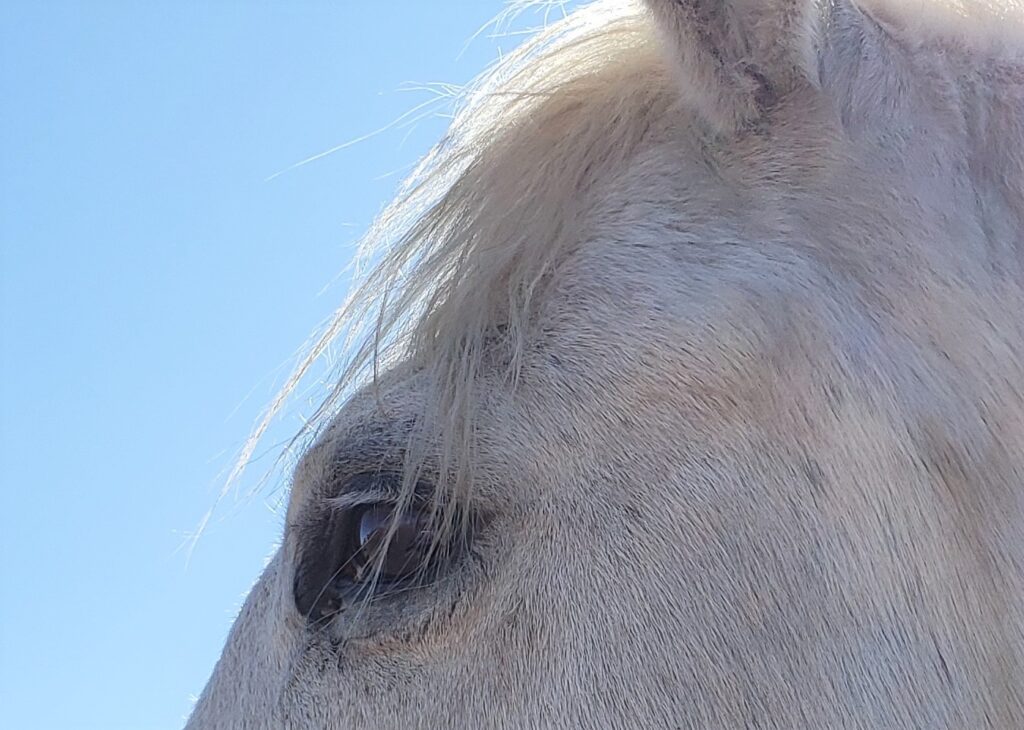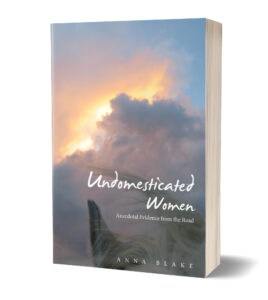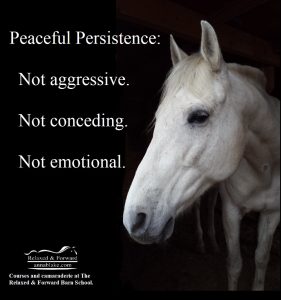
When Nube (nu-bay) was two and first diagnosed with ulcers, it felt rare, almost exotic. People were just learning about ulcers. Phantom thoughts worried us, but we didn’t know what we didn’t know. Ulcers were unknown in the general population, or so we thought. Maybe at the race track, but never our horses. So rare you could distance yourself by thinking others were bad owners. Gastrogard wasn’t even available yet. But I’d just found out my young, unstarted horse had ulcers, so that meant I had them, too.
My research found a brief list of causes but Nube didn’t fit anywhere on the list. The scope didn’t lie, but now I had all the guilt and no way to tell what to change so they wouldn’t come back. I posted a question on social media, where all the amateur vets practice. I’m not being sarcastic. We have a lot of wisdom, even if the vets call it “anecdotal.” In some cases, we do know what we know.
I asked people how they discovered their horse had ulcers. It still amazes me, but every response people mentioned wasn’t on that list. Everyone agreed that the list failed them. I began to curate an expanded list of ulcer causes.
I made myself an expert in that way you might if you had a young dream horse. I always prided myself on being educated so I didn’t hold back. The more I learned, the more I understood how common ulcers are, practically inevitable and uncurable. Ulcers are a condition to be managed. As common as manure in the morning. We hope, because ulcers and colic are cousins.
Nube’s ulcers were treated and they returned each time. I found out that some horses in his bloodline suffered from them as chronically as he did. Some of the first ulcer management articles were written by the owner-trainer of a half-sibling longlisted for our Olympic team. The horse didn’t qualify, but like me, her owner got a first-hand education that cut deep. There is evidence ulcers may be hereditary, or maybe they’re so common, it just seems that way.
Many horses are stoic and don’t show pain. Sixty percent of horses diagnosed by scoping showed no previous symptoms at all. Horses hide their pain, we have to look to find it. Nube was sensitive and we’d shared a calming signal language all his life. He was demonstrative and honest. The perfect temperament for a performance horse. But we were understanding more about ulcers and lots of performance horses had them. Lots of pleasure horses, too.
The causes seemed to multiply. Horses kept in stalls certainly had ulcers but so did horses in big pastures. Domestic horses and feral horses. Trailering was a huge factor, but horses who stayed home were just as susceptible. Horses fed two flakes morning and night, (how most barns did it then,) but also horses on free choice grazing. Maybe the worst was knowing that some horses have ulcers as a result of chronic pain from other things we didn’t know much about, like kissing spine or stifle issues. You couldn’t cure the ulcers as long as they were tangled up with other issues.
I don’t mean to sound like a whiner here. We have learned so very much about the health of horses and veterinary science is light years ahead of where it was just a few decades ago. It’s great news. Unless it came too late for your horse.
Not only does aggressive fear-based training cause ulcers. It also shuts horses down enough that they show no symptoms. By now, calming signals were my primary language, and many times horses use that language to show pain. I had clients who hired me to fix their horses, but I only racked up more amateur vet hours diagnosing ulcers. Anxious horses were “corrected” not by training but by ulcer meds. Maybe trainers are the best at seeing ulcer symptoms because owners mistake them training issues so often. Some clients got their horses checked out and some horses struggled until they were sold or suffered colic.
I worked with rescue horses who had moved from owner to owner, showing chronic ulcer signals. It’s a death spiral hard to escape for a horse who is always living through a series of events that causes ulcers. Other times, owners unable to see emotional progress fired me for babying their horses, accusing me of spoiling them with all my listening and being affirmative. I felt the worst for those horses.
No matter how much we know or how hard we try, we can’t control the health of our horses. They are still mysteries. Diagnosis isn’t a perfect science and each week, we learn of new health concerns. Horses are powerful and dynamic, yet as fragile as cut flowers. Still, we continue to train with so much aggression that we make them sick.
What could I do? I’m a trainer, not a vet. If training could cause ulcers, was it possible that training might somehow support a horse to be more ulcer-resistant? When I worked with Nube, not only did I use my methods of Affirmative Training, I used them as if it were a matter of life or death. Because how we train is exactly that. And it’s the one thing we can control.
Nube was my personal horse, the finest horse I’d ever owned; brilliant and willing, sensitive and enthusiastic. He was all curiosity, so I presented training as a puzzle, cued with my breath, and gave him time to solve it. He’d trot at liberty to pick me up at the mounting block, as if riding was his idea. My hands didn’t pull, so his neck stayed soft. Short rides, light and happy. But his ulcer issues never settled for long.
You want to think you can make a karma deal with the fickle horse gods. You promise to work for your client’s horses with more imagination and understanding, extrapolating what you know for an individual solution, and hoping to trade that for a miracle at home.
What I know now, after years of doing my best, is Nube never got right. Maybe today we could do better for him, but that’s worthless comfort. I continue to write about Affirmative Training methods. I routinely demonstrate the effectiveness of acknowledging calming signals at clinics with strange horses. No doubt other horses benefitted from all I learned with Nube. In a darkly bittersweet cynical way, I suppose he helped my career but at a price I would never have chosen to pay.
(to be continued…)
…
 Available Now! Undomesticated Women, Anectdotal Evidence from the Road, is my new travel memoir. Ride along with us on a clinic tour through 30 states, 2 oceans, and 14k miles with me and my dog, Mister. It is an unapologetic celebration of sunsets, horses, RV parks, roadkill, diverse landscapes, and undomesticated women. Available now at Amazon, Barnes and Noble, and signed copies from me.
Available Now! Undomesticated Women, Anectdotal Evidence from the Road, is my new travel memoir. Ride along with us on a clinic tour through 30 states, 2 oceans, and 14k miles with me and my dog, Mister. It is an unapologetic celebration of sunsets, horses, RV parks, roadkill, diverse landscapes, and undomesticated women. Available now at Amazon, Barnes and Noble, and signed copies from me.
…
If you or your horse appreciate what I write, please Subscribe to this blog or join us at The Barn School. To follow Bhim’s Training Diary, click here.

Want more? Become a “Barnie.” Subscribe to our online training group with affirmative demonstration videos, audio blogs, daily quotes, free participation in “group lessons”, and live chats with Anna. Become part of the most supportive group of like-minded horsepeople anywhere.
Anna teaches ongoing courses like Calming Signals and Affirmative Training at The Barn School, along with virtual clinics and our infamous Happy Hour. Everyone’s welcome.
Visit annablake.com to find archived blogs, purchase signed books, schedule a live consultation, subscribe for email delivery of this blog, or ask a question about the art and science of working with horses.
Affirmative training is the fine art of saying yes.
The irony and unfairness of an ulcer problem in your horse is both blinding & eye opening. That it can happen to your horse, who was being raised under the best physical and emotional care & conditions possible, is frightening. And so very heartbreaking. Owning animals is as brutal as it is joyful. And we are gluttons for punishment.
Well, at least we aren’t quitters?? Thanks SueAnn.
The only up side I can think of is that once we accept how much of our horses’ health ends up being guesswork, even by experienced and well trained vets, the more we can research all the options and make our own informed decisions. Nothing guarantees a good outcome but, for me, it’s better to feel that I did the best I could.
I so agree. Thanks Susan
in these darkest days of winter, do not succumb to the lack of light. It will return. Hugs, my friend.
Thank you, my friend. And we both know that good memories survive in us, regardless.
The really depressing thought is how many horse “owners” never have a clue that their horses HAVE ulcers or make an effort to find out that no, their horse doesnt have a “training issue”. The sad part is those very horses could go thru life without help.
You & likely anyone who reads this blog havent let that happen. That matters, Anna.
So right, Maggie. Thanks.
It is thanks to you, and Nube, that I figured out many of Bella’s behavior issues were ulcer-related. That improved her life and our relationship. All my horses since have benefited from that experience. Gut X has been part of my daily routine for all of them since and they have been happier horses for it.
When delivering bad news turns into good news. Thanks, Peggy. Now we know and we can do better.
I can relate…the struggle is real. Great article 👏 I feed small 1/4 flake of alfalfa while grooming, before I tack up or work in the round pen. It seems to work. Better than on an empty stomach I believe. Thank you for sharing your wisdom.
Xo
Feeding while tacking up is such a good habit. Thanks, Deborah
Am I right that there was a time – before gastroscopy – that the only surefire way to determine if a horse had ulcers was through a necropsy? It is a frightening to know that ulcers in horses is so prevalent. Thanks for such an important revelation about this topic, Anna.
I’ve never heard that but it’s an interesting thought. How else would they discover them? I think so. I hate to think of horses in pain who got the “problem horse’ label. Thanks, Lynell. I had a good time thinking about this.
What a heart-rending account, on so many levels. Made me think of animal behaviorist Dr Sophia Yin, who did so, so much to teach low-stress handling in veterinary clinics, and in the end she still felt it wasn’t enough. https://youtu.be/OIjMBfhyNDE?feature=shared&t=22
She is missed. Thanks Gina
Thank you for that link, Gina – it was very interesting. I felt so much sadness for Dr. Yin when she spoke about her dog.
I think all of us have seen some of that old fashioned “training” or actual abuse at some point in our lives – I remember far too much of it towards horses when I was a kid. Enough said!
Thanks again